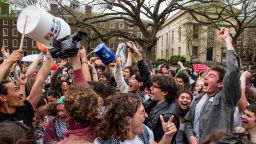A group of 13 conservative US federal judges are vowing to not hire Columbia University law students or undergraduates because of how the school has handled pro-Palestinian demonstrations on its campus in recent weeks.
The judges sent a letter to Columbia President Minouche Shafik and the dean of Columbia’s law school Gillian Lester, on Monday, outlining their position and describing the Manhattan campus as “ground zero for the explosion of student disruptions, antisemitism and hatred for diverse viewpoints on campuses across the Nation.”
Columbia University has become the epicenter for protests against the war in Gaza which have spread throughout dozens of campuses across the country. Last week, at the request of the university, the New York Police Department was called in to dismantle an encampment that demonstrators had set up on school grounds resulting in hundreds of arrests. Police also cleared protesters who had taken over a building on the campus.
“As judges who hire law clerks every year to serve in the federal judiciary, we have lost confidence in Columbia as an institution of higher education. Columbia has instead become an incubator of bigotry. As a result, Columbia has disqualified itself from educating the future leaders of our country,” the letter states.
The letter was shared with CNN by Judge James C. Ho, circuit judge of the U.S. Court of Appeals for the Fifth Circuit and one of three primary signatories including Judge Elizabeth L. Branch,? circuit judge of the U.S. Court of Appeals for the Eleventh Circuit and Judge Matthew H. Solomson, who sits on the U.S. Court of Federal Claims.
CNN has reached out to Columbia University for comment.
The judges who signed the letter were all appointed by former president Donald Trump and primarily serve in Texas. The list includes Judge Matthew Kacsmaryk, who serves in the Northern District of Texas in Amarillo and notably issued the order blocking broader access to mifepristone. That decision was eventually heard by the Supreme Court last March.
Federal judges can have significant influence in a person’s law career, particularly as they are entering the field. They typically hire law school graduates for clerkships that can eventually lead to high-paying and prestigious jobs.
In their letter, the judges also outline a set of steps the university should take, including recommending “serious consequences” for students and faculty who participated in campus disruptions.
Columbia University has a rich history of student protests which throughout the years has included different levels of disruption including the takeover of school buildings as it was done last week when students occupied Hamilton Hall, eventually leading to dozens of arrests.
The judges also write that unlawfully trespassing and occupying public spaces is sufficient basis to warrant incarceration.
“Universities should also identify students who engage in such conduct so that future employers can avoid hiring them. If not, employers are forced to assume the risk that anyone they hire from Columbia may be one of these disruptive and hateful students,” the judges wrote.





